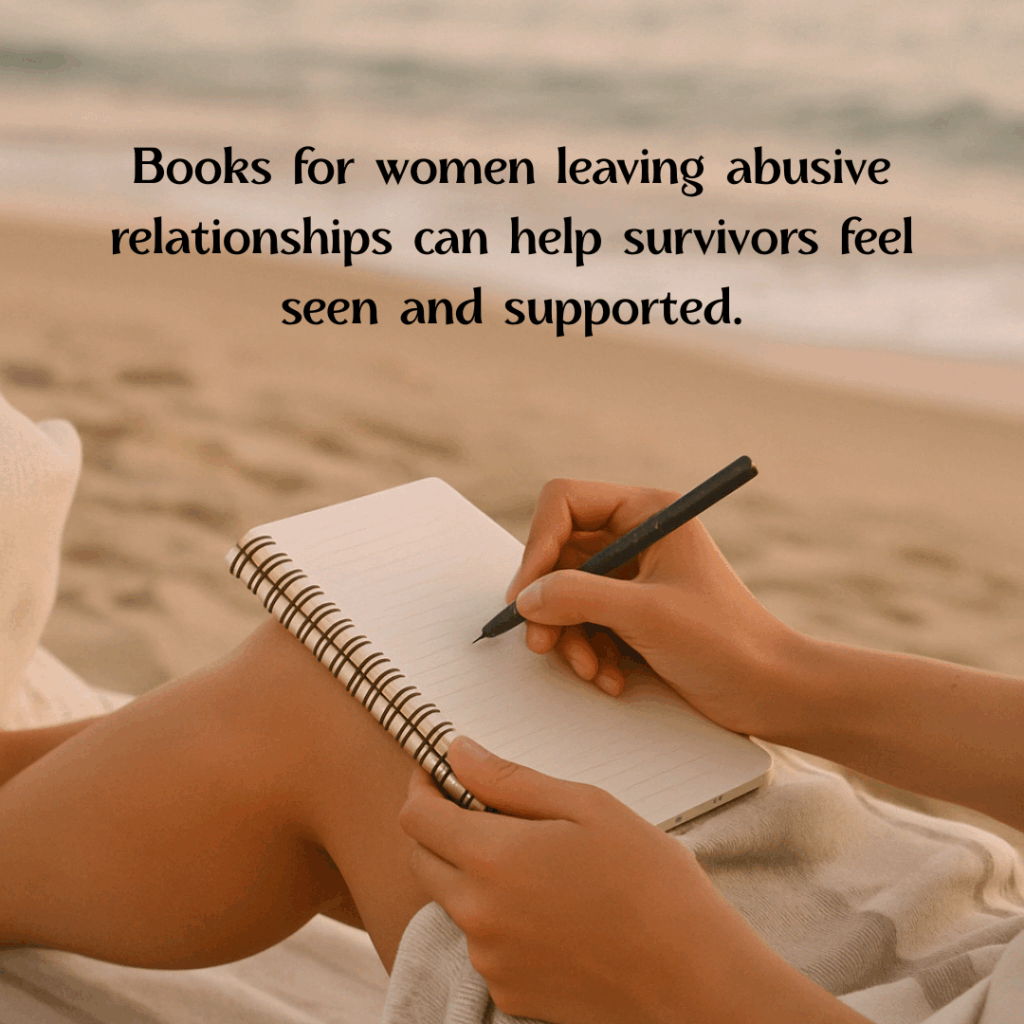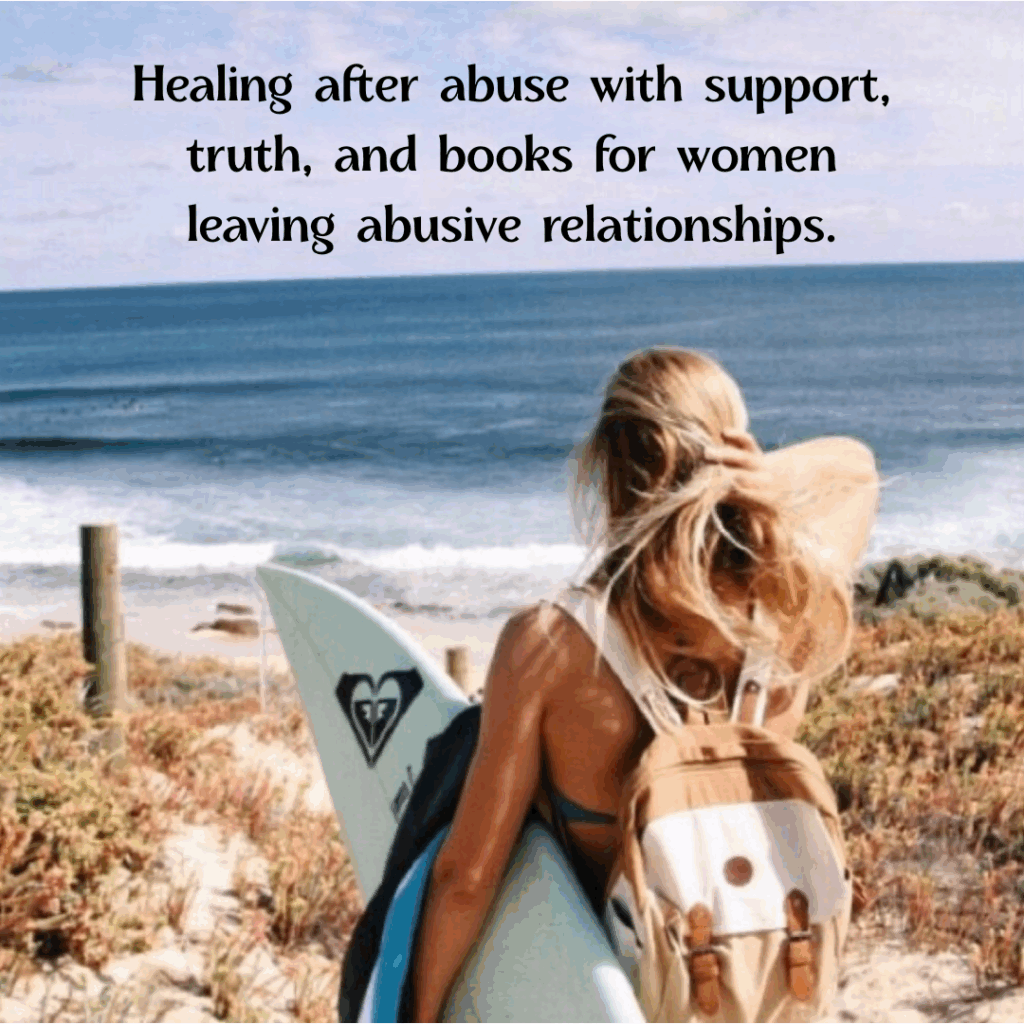Books for women leaving abusive relationships have a power most people don’t expect—they can name what you’ve lived through, validate what you feel, and quietly remind you that you’re not alone.
I’ll never forget the moment I realized I wasn’t alone.
It didn’t come from a friend. Or a therapist. Or even a support group.
It came from a book.
A book that put words to what I had been living through.
A book that didn’t make me feel crazy.
A book that made me stop, take a deep breath, and whisper to myself, “It wasn’t just me.”
Books have that kind of power.
They can name what you’ve been through.
They can help you start to heal.
They can show you that you’re not alone, and never were.
As someone who works with women every day who are in, leaving, or recovering from abusive relationships, I find myself recommending the same few titles over and over again. Not because I’m trying to fill a reading list, but because these books truly change lives—mine included.
If you’re feeling lost, confused, or exhausted from trying to explain something no one seems to understand… let these books help you find your way back to you.
Here are six of the most powerful books I’ve ever read, books that have helped me, helped my clients, and continue to be lifelines for women who are trying to make sense of the mess, the fear, the silence, and the grief. If you’re searching for books for women leaving abusive relationships, you’ll find truth and strength in these pages.
Why These Books for Women Leaving Abusive Relationships Matter
These books for women leaving abusive relationships aren’t just good reads, they’re lifelines. Whether you’re still in it, just starting to break free, or years into your healing, these books speak to different stages of the journey. They helped me name what was happening, understand it wasn’t my fault, and start reclaiming my life. Each of these books for women leaving abusive relationships opened a different door to healing. I hope they do the same for you.

1. Why Does He Do That?
by Lundy Bancroft
This was the book that flipped the light switch.Before I read it, I kept thinking:
Maybe it’s just me. Maybe he didn’t mean it. Maybe if I were more patient, less sensitive, or tried harder…
But this book shattered all of that.
It cracked open my entire understanding of abuse. I was stunned by how accurately Bancroft described my ex—even though he’d never met him. It was like someone had finally named what I couldn’t explain.
This book helped me see what I hadn’t wanted to admit:
Abuse isn’t always about yelling or hitting or rage.
It’s not about how bad his childhood was.
And it’s definitely not something you can fix by being a better communicator.
It’s about control.
And once I saw that, I couldn’t unsee it.
Bancroft breaks down the mindset of abusive men in a way that’s clear, direct, and deeply validating. He shows how they twist reality, shift blame, play the victim, and always—always—find a way to make it your fault.
I underlined so many pages that the book is now a highlighter’s dream. But what stuck with me more than any quote was this: It wasn’t me. It was never me.
If you’re wondering, Was it really abuse? or Why does he say he loves me but treat me like this?—this is the place to start.
You might also want to read: Gaslighting in Relationships: How to Break Free
2. The Verbally Abusive Relationship
by Patricia Evans
This was the book that helped me stop second-guessing myself.
Because for the longest time, I didn’t call it abuse.
I called it “miscommunication.”
I said we were just bad at talking.
I thought maybe I was too sensitive.
But The Verbally Abusive Relationship gave me the language I didn’t know I needed.
Patricia Evans doesn’t just explain what verbal abuse looks like, she explains what it feels like: the confusion, the self-doubt, the way you leave conversations more unsure of yourself than when you started. The way you start to believe that you are the problem.
This book showed me that abuse doesn’t always come with yelling or slurs or threats. Sometimes it comes in the form of silence. Sarcasm. A tone. A look. A constant rewriting of reality that leaves you questioning your own memory.
I remember reading it and thinking, That’s what he did. That’s what I’ve been feeling—but I couldn’t explain it until now.
If you’ve ever walked away from a conversation wondering what just happened… if you’ve ever tried to explain what he said but couldn’t quite make it make sense… if you’ve ever felt like you were unraveling from the inside out, this book will feel like validation and oxygen at the same time.
It didn’t just help me understand what was happening.
It helped me reclaim my voice.
And once you can do that, you can start rebuilding everything he tried to take.
3. It’s My Life Now
by Meg Kennedy Dugan & Roger Hock
No one really tells you what to expect after you leave.
People say “just get out” like it’s a finish line, like once you leave, everything will magically get better. But the truth is, leaving is just the beginning.
You’re still carrying the trauma.
Still questioning yourself.
Still trying to untangle everything he made you believe about who you are and what you deserve.
It’s My Life Now was the book that met me there, in the quiet, lonely, confusing space after I left. It didn’t rush me or tell me to “move on.” It walked with me.
It helped me breathe again.
This book gently guides you through the real work of healing: rebuilding confidence, coping with trauma responses, navigating court and custody, and learning to trust your own instincts again. It talks about safety planning, setting boundaries, finding your footing, and doing it one step at a time.
When everything felt like survival mode and I didn’t know where to begin, this book reminded me that I didn’t have to figure it all out. I could start small. One breath. One choice. One quiet act of reclaiming my life.
If you’re standing in that foggy middle ground, where you’re out but still feel lost, this is the guidebook I’d hand you.
Also read: Essential Steps to Take Before Leaving an Abusive Relationship
4. Healing the Trauma of Domestic Violence
by Edward S. Kubany
Healing after abuse isn’t just emotional, it’s physical. It’s mental. It’s relational. And sometimes, it’s hard to even know where to begin.
That’s where this book comes in.
Healing the Trauma of Domestic Violence is a workbook written specifically for survivors dealing with PTSD and trauma from abuse. It doesn’t just talk about what happened—it helps you actively work through the aftermath, at your own pace and in your own way.
It includes guided exercises to help with things like flashbacks, guilt, shame, anxiety, and feeling stuck. For many survivors, it becomes a safe space to process what they’ve been through and begin putting the pieces back together.
What makes this book especially powerful is that you don’t need to be in therapy to benefit from it. Whether you’re just beginning your healing journey or you’ve been out for a while but still feel triggered or frozen by the past, this book offers structure, support, and practical tools that meet you right where you are.
If you’re craving something tangible, something that helps you do the healing, not just think about it, this workbook is one of the best places to start.
5. The Body Keeps the Score
by Bessel van der Kolk
This is one of those books I keep coming back to, especially during the hard seasons.
I’m actually rereading it right now, because even after leaving, even after doing so much work to heal, trauma can still show up in my body when I least expect it. Something small happens, a sound, a shift in tone, a stressful moment, and suddenly I’m back in that fight, flight, or freeze state.
This book helped me realize that I wasn’t broken.
That I wasn’t weak.
That I wasn’t “stuck.”
I was traumatized. And my body was doing everything it could to protect me.
The Body Keeps the Score explains what so many survivors feel but can’t quite put into words—that trauma isn’t just something you “get over.” It lives in your nervous system. It affects your sleep, your immune system, your memory, and your relationships. It can linger for years after the abuse is over, long after people expect you to be “fine.”
And that’s not your fault.
This book made me feel seen on a physical level. It doesn’t just talk about what trauma is, and it shows you what to do next. From EMDR to yoga, movement therapy to breathwork, it offers hope and science-backed tools that help you finally feel safe in your body again.
You don’t have to read it cover to cover. You don’t need to understand every clinical term. But I promise you—if your body is still holding onto fear, if your mind knows you’re safe but your body doesn’t believe it yet, this book can be a turning point.
You’re not crazy. You’re not overreacting. You’re not failing at healing.
You’re a survivor with a body that remembers.
And this book can help you gently teach it a new story.
Also read: Understanding and Overcoming Reactive Abuse
6. No Visible Bruises
by Rachel Louise Snyder
This book didn’t just move me, it woke me up.
No Visible Bruises isn’t a self-help book. It doesn’t give you healing exercises or gentle affirmations. What it gives you is truth. Unfiltered, uncomfortable, unforgettable truth.
Rachel Louise Snyder tells the stories behind the statistics, the women who weren’t believed, the families who fell through the cracks, the lives lost because no one asked the right questions or listened closely enough when they did.
Reading this made me feel something I hadn’t expected: seen and furious.
Because suddenly I understood…
It wasn’t just me.
And it wasn’t just him.
The silence around abuse is built into our systems, our culture, even our well-meaning communities.
This book gave words to what I’d experienced in ways I didn’t know I needed. It showed how easily abuse escalates behind closed doors, and how often survivors are failed, not just by their abuser, but by courts, churches, police, and even friends who meant well.
It’s heartbreaking. It’s validating. And it’s one of the most important books I’ve ever read.
If you’ve ever felt invisible… dismissed… or exhausted from trying to explain something no one seems to understand, this book is for you.
Because what happened to you isn’t just a personal story.
It’s a societal one.
And your story matters.
When we share what we’ve lived through, we help shift the narrative and remind others that they’re not alone either.
This book reminded me why I do this work, supporting women, sharing truth, and recommending the best books for women leaving abusive relationships. We can’t afford to stay quiet anymore.

Let it be your companion.
Let it be your mirror.
Let it be the first step toward reclaiming your life. The right books for women leaving abusive relationships can offer clarity, comfort, and courage when you need it most.
Pick one. Start small. You don’t have to do this alone.
Pick one. Start small. You don’t have to do this alone.
If you’re not sure where to start, you’re not alone. Reach out, I’d be honored to walk with you through this.
Want more support beyond these books for women leaving abusive relationships? Explore more on my blog, or check out my digital guides and coaching sessions if you’re ready for one-on-one support from someone who’s been there.
P.S. I’d love to hear from you, have you read any of these books? Did one of them change your life like it did mine? Leave a comment, message me directly, or ask a question. Your story might be exactly what someone else is searching for. Your insight could be the lifeline they need.
If this list of books for women leaving abusive relationships helped you, I’d love to know which one resonated most. Your voice matters.





